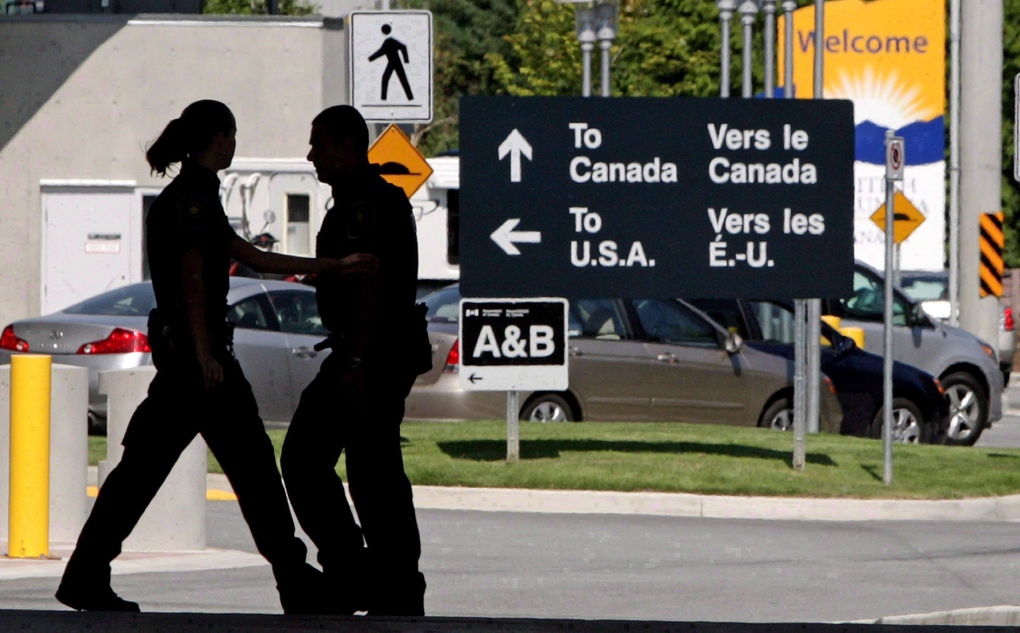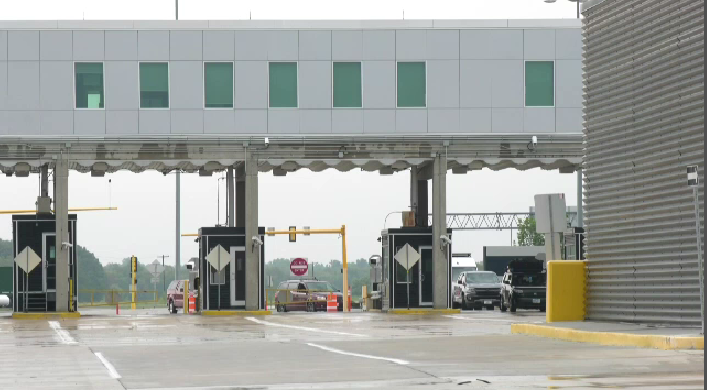Could the possible PSAC strike affect Canadian border crossings?
 Canadian border guards are silhouetted as they replace each at the Douglas border crossing in Surrey, B.C., on Aug. 20, 2009. (Darryl Dyck / THE CANADIAN PRESS)
Canadian border guards are silhouetted as they replace each at the Douglas border crossing in Surrey, B.C., on Aug. 20, 2009. (Darryl Dyck / THE CANADIAN PRESS)
With the Public Service Alliance of Canada (PSAC) voting overwhelmingly in favor of a strike this week, the federal government is releasing details on how the possible job action could affect the country’s border crossings.
A spokesperson for the Canada Border Services Agency (CBSA) said in the event of a labour dispute, it is expected their services for travellers and businesses will be maintained.
According to CBSA, workers who are in a legal strike portion make up about 17.6 per cent of their employee population, and they do not provide direct front-line operational services, like processing travellers and commercial goods.
CBSA officers make up the largest portion of their workforce, about 46 per cent, and are not in a legal strike position, the spokesperson said.
“The CBSA will respond quickly to any job action or work disruption in order to maintain the security of our border, ensure compliance with our laws, and facilitate the flow of legitimate travel and goods.”
 Cars line up at to enter Canada at the Emerson border crossing on Aug. 9, 2021. (File Image: Jamie Dowsett, CTV News)
Cars line up at to enter Canada at the Emerson border crossing on Aug. 9, 2021. (File Image: Jamie Dowsett, CTV News)
PSAC announced Wednesday its members voted "overwhelmingly" in favour of a strike if a deal is not reached with the federal government. Additionally, 35,000 Canada Revenue Agency workers voted in favour of strike action last week.
Meantime, the federal government has released details on how a potential strike could affect services to Canadians, including tax filings, RCMP administration, and Health Canada services.
The CBSA spokesperson told CTV News the feds are committed to negotiating collective agreements that are fair for employees and reasonable for taxpayers.
PSAC president Chris Alyward told CTV News the union and Treasury Board of Canada returned to the bargaining table this week.
Key issues between both sides include wages to keep up with inflation, as well as flexibility around remote work and return-to-office.
- With files from CTV’s Leah Larocque
CTVNews.ca Top Stories

America votes: How the election could impact the Canada-U.S. border
While America's southern border remains a hot button issue on the campaign trail, the result of the U.S. election in November could also impact the northern frontier with Canada, which remains the longest undefended border in the world.
NEW THIS MORNING This Ottawa photo radar camera issued 200 tickets a day over the summer
New data shows the automated speed enforcement camera on King Edward Avenue, between Bolton Street and St. Patrick Street, issued 6,337 speeding tickets in August, the highest number of tickets issued by Ottawa's 40 photo radar cameras.
Couche Tard, On the Run parent firms challenge Health Canada nicotine pouch rules
Convenience store firms that operate thousands of outlets across Canada are taking the federal government to court to overturn regulations that restrict the sale of nicotine pouches to pharmacies.
Investigation underway after 2 workers die inside silo
The Ministry of Labour is investigating a workplace incident that claimed the lives of two people in Georgian Bluffs, south of Owen Sound.
The Menendez brothers case is not the only one that's been affected by a true crime documentary
Being an armchair detective has turned into an American obsession, fueled by an abundance of true-crime content in podcasts and television series. But some of those projects have sparked actual legal developments.
Tax rebate: Canadians with low to modest incomes to receive payment
Canadians who are eligible for a GST/HST tax credit can expect their final payment of the year on Friday.
Homeowners hit by Hurricane Helene face the grim task of rebuilding without flood insurance
A week after Hurricane Helene overwhelmed the Southeastern U.S., homeowners hit the hardest are grappling with how they could possibly pay for the flood damage from one of the deadliest storms to hit the mainland in recent history.
B.C. Lions snuff out Calgary Stampeders playoff hopes with 32-15 win
The loss that extinguished the Calgary Stampeders playoff dreams Friday provided some deja vu for head coach Dave Dickenson.
Lost your smell during a bout of COVID? Local researchers are working to reverse that.
Bruzzese came down with COVID-19 in February 2023, and received her injection at the end of March. “Being able to recognize smells is something we take for granted, until you can’t.”


































